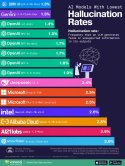AI for science HW’s Pangu drug model for drug discovery (target identification, molecular docking, drug design etc) identified potentially the first vaccine molecule for Leishmaniasis. Traditional molecular dynamics models are too slow尤鹏透露,盘古药物分子大模型近日新增了靶点口袋发现、分子对接、分子属性预测、自定义属性建模、分子聚类、口袋分子设计、自由能微扰、合成路径规划、分子优化、分子搜索等十大AI制药核心场景,将药物设计效率提升33%,实现早研阶段的全流程加速。
You are using an out of date browser. It may not display this or other websites correctly.
You should upgrade or use an alternative browser.
You should upgrade or use an alternative browser.
Artificial Intelligence thread
- Thread starter 9dashline
- Start date
I can definitely see teams use it to create mood maps, script drafts, just to sketch out initial artwork etc.I disagree the studios will make bigger and better stuff within the same budget and time.
A team of people using AI is still going to put out a much much better product than a single person using AI.
The companies can decide whether to downsize to improve their profit margins or keep/expand to increase potential revenue.
Now, kling ai is available as an IoS app. I already downloaded it. I think this is a good way to get really popular.
proelite
Junior Member
Snowflake model is a tech demo for their Apache Spark offerings.
It would need an AGI x100 to figure out how to deal with Apache Spark properly.
Look at the list for spark configurations to get an idea of how overly complex this system this.
Spark is not recommended for ai training at all. I think most use Ray instead.It would need an AGI x100 to figure out how to deal with Apache Spark properly.
Look at the list for spark configurations to get an idea of how overly complex this system this.
proelite
Junior Member
Spark is not recommended for ai training at all. I think most use Ray instead.
I meant an AI trained to use Spark.
Some revealing commentary on the US mindset towards AI restrictions. I guess this is what happens when you put non-tech morons in charge of tech policy. They treat it as a magical superweapon.
"If my blind assumption that the whole world will be upended in the next four years is true, then I win in the short term. Don't bother worrying about the long term."
“I think AGI will probably get developed during this president’s term,” OpenAI CEO Sam Altman Bloomberg in January, meaning that technology powerful enough to carry out economically valuable work and make new scientific discoveries by itself would emerge in the next four years under U.S. President-elect Donald Trump. What’s more: China appeared to be catching up in the race to get there first.
For some U.S. officials, those realizations only underlined what they had been arguing for years: restricting China’s access to AI was now essential for U.S. national security. Whichever superpower achieves AGI first, the thinking goes, is likely to obtain a decisive strategic advantage, reap new scientific discoveries, wield powerful new weapons and surveillance technologies, and leave its competitor’s economy in the rear-view mirror.
“I think it is quite likely that the Trump Administration will find this policy appealing, and the reason is that we are in a critical moment in AI technology competition with China,” says Greg Allen, director of the Wadhwani Center for AI and Advanced Technologies at the Center for Strategic and International Studies (CSIS), a Washington think tank. Contrary to rumors of AI’s progress reaching a plateau, OpenAI’s o3 model shows new capabilities are continuing to emerge rapidly, Allen says, leading many in Washington and Silicon Valley to bring forward their predictions of when they think AGI will arrive. And while Trump himself is unpredictable, many of the aides and policymakers set to occupy senior positions in his Administration are China hawks. “It matters a lot that the United States gets there before China,” says Allen, who supports the Biden Administration's new rules. “It is a pretty decisive move to make life much harder for China’s AI ecosystem.”
Allen agrees that they might push buyers toward China. But not fast enough, he says. It takes five to 10 years for a chipmaker to turn even huge investments into machines capable of making advanced new chips, and China simply doesn’t have that time, assuming AGI is on the horizon. “They are really stuck because they cannot get the advanced equipment that they need,” Allen says. “The alternative to American AI chips isn’t Chinese AI chips. It’s no AI chips.”
"If my blind assumption that the whole world will be upended in the next four years is true, then I win in the short term. Don't bother worrying about the long term."
yeah, so as usual, the DC blob is run by a bunch of people who has no idea what AGI is, the implication of "AGI" or the importance of advanced node to get to "AGI".Some revealing commentary on the US mindset towards AI restrictions. I guess this is what happens when you put non-tech morons in charge of tech policy. They treat it as a magical superweapon.
"If my blind assumption that the whole world will be upended in the next four years is true, then I win in the short term. Don't bother worrying about the long term."

